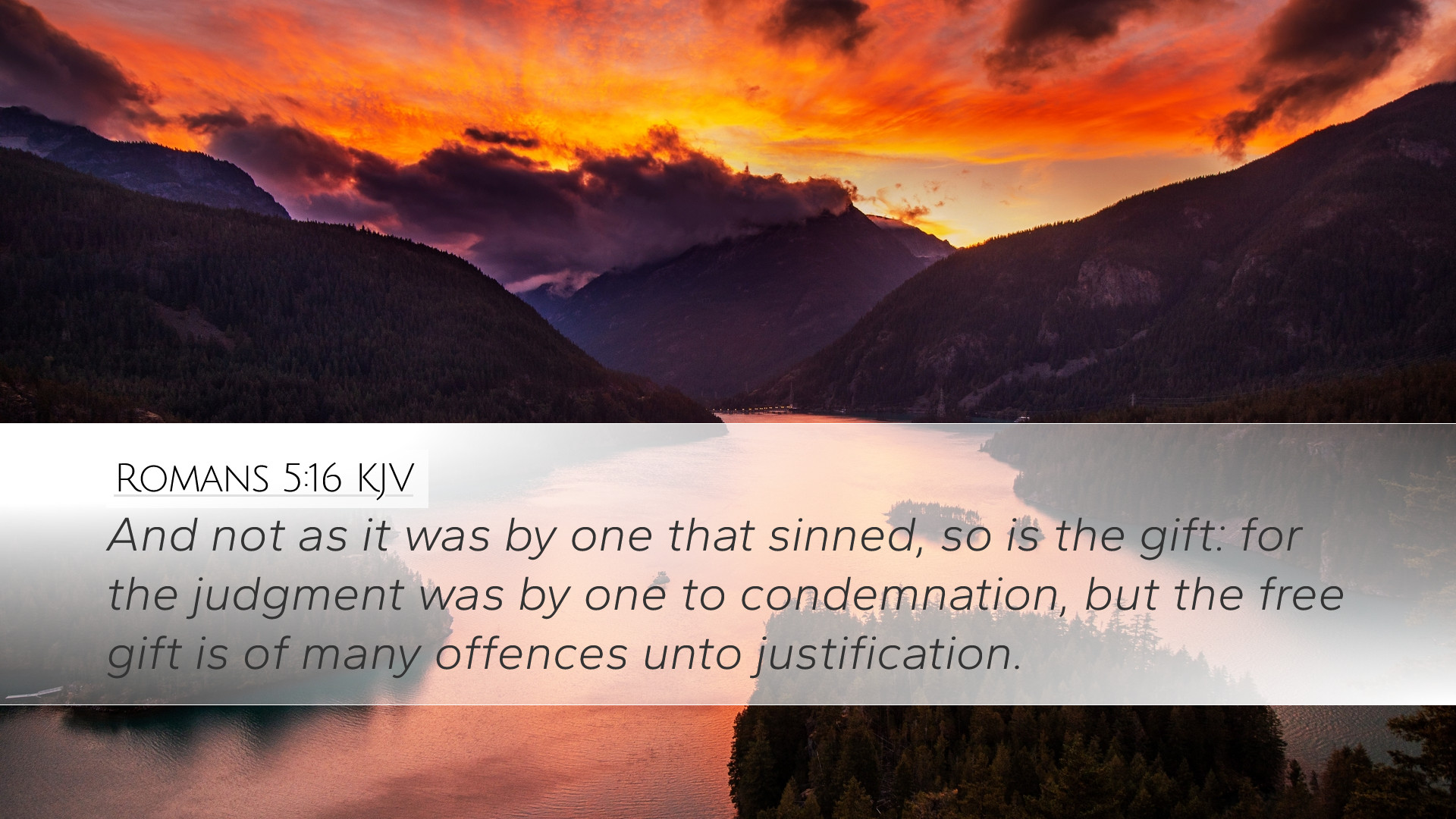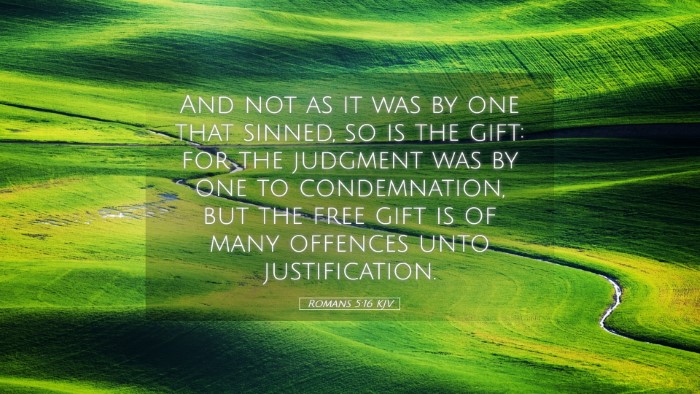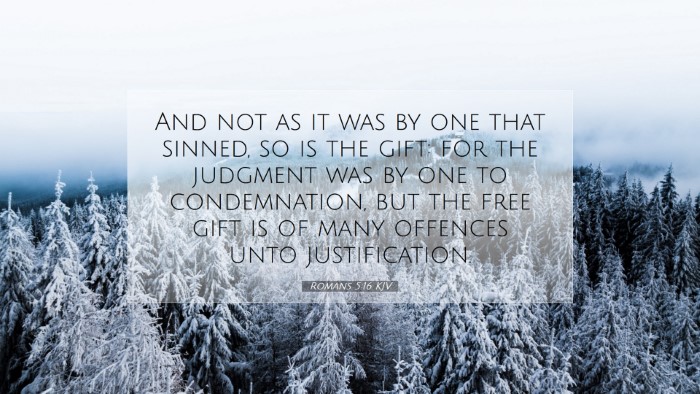Old Testament
Genesis Exodus Leviticus Numbers Deuteronomy Joshua Judges Ruth 1 Samuel 2 Samuel 1 Kings 2 Kings 1 Chronicles 2 Chronicles Ezra Nehemiah Esther Job Psalms Proverbs Ecclesiastes Song of Solomon Isaiah Jeremiah Lamentations Ezekiel Daniel Hosea Joel Amos Obadiah Jonah Micah Nahum Habakkuk Zephaniah Haggai Zechariah MalachiRomans 5:16
Romans 5:16 KJV
And not as it was by one that sinned, so is the gift: for the judgment was by one to condemnation, but the free gift is of many offences unto justification.
Romans 5:16 Bible Commentary
Commentary on Romans 5:16
Romans 5:16 states, "And not as it was by one that sinned, so is the gift: for the judgment was by one to condemnation, but the free gift is of many offences unto justification." This verse sets forth a juxtaposition between the consequence of Adam's sin and the redemptive gift through Christ. Understanding this passage is pivotal for grasping the apostle Paul's broader argument in his epistle to the Romans regarding sin, grace, and justification.
Overview of Context
This verse is located within a section where Paul contrasts Adam’s act of disobedience, which introduced sin into the world, with the act of grace through Jesus Christ. The apostle elaborates on the theological implications of these two pivotal events in human history. Each act sets the stage for humanity’s relationship with God, distinguishing between condemnation and justification.
Commentary Insights
-
Matthew Henry's Commentary:
Matthew Henry emphasizes the disparity between the introduction of sin by one man—Adam—and the ensuing grace offered through Christ. He notes that the gift of grace is abundant, standing in stark contrast to the singular act that led to condemnation. Henry highlights how this demonstrates God's desire to redeem rather than to condemn. Adam's transgression brought sin and death, but Christ's righteousness and grace bring life, showing the overwhelming nature of divine grace over sin.
-
Albert Barnes' Notes:
Albert Barnes elaborates on the idea that the "gift" Paul mentions is greater in scope than the harm done by sin. He elucidates that while sin entered through one man's disobedience, God's response was to offer a gift that covers numerous offenses. Barnes points out the nature of this gift—eternal life, justification, and reconciliation with God. He argues that Paul’s wording underscores the sufficiency of Christ's atonement for all who believe, reinforcing the theme of grace as a transformative power in the believer's life.
-
Adam Clarke's Commentary:
Adam Clarke provides a thorough interpretation that focuses on the judicial implications of sin and grace. He suggests that the "judgment" resulting from Adam’s sin was a judicial penalty placed on humanity, whereas the "free gift" represents God's grace that nullifies that sentence for those who accept it. Clarke emphasizes that the gift is not only a counter to individual sins but is available freely, pointing to the nature of faith in receiving this gift. He also observes that the sovereignty of God in dispensing grace illustrates His mercy, which surpasses human understanding.
Theological Implications
The theological implications of Romans 5:16 are profound. It delineates the nature of sin and the grace of God in the context of redemptive history. Paul’s argument clearly delineates between the actions of Adam and Christ, drawing a parallel that leads to the understanding of justification by faith. In this way, the verse transcends mere historical narrative; it invites believers to comprehend their own standing before God and the extensive coverage of Christ’s righteousness over their sins.
Applications for Today
This passage speaks volumes to contemporary believers, encapsulating the essence of the Gospel’s promise. Here are some applications for pastors and theologians to consider:
-
Encouragement in Preaching:
Pastors can encourage their congregations about the depth of God's grace, illustrating how it not only forgives but also justifies. Emphasizing the abundance of grace available through faith in Christ can lead to greater assurance in the believer’s walk with God.
-
The Doctrine of Justification:
Students and theologians can utilize this verse to engage in deeper discussions about justification, exploring how it is rooted in grace and is apart from works. The contrast between condemnation and justification through faith provides a foundational understanding of salvation in Christian doctrine.
-
Understanding Human Nature:
The verse prompts reflection on the human condition post-Fall and the need for redemption. Exploring how Adam's sin affects not only individuals but also humanity as a whole can provide context when discussing the necessity of Christ's redemptive work.
Conclusion
Romans 5:16 is a rich source for theological reflection, carefully illustrating the devastating effects of sin alongside the extravagant grace of God. With insights from prominent commentators, it offers profound truths that challenge and inspire believers to embrace the free gift of justification through faith. As pastors, scholars, and students engage with this text, they are reminded of the transformative power of grace that redefines their relationship with God in light of Christ’s righteousness.


